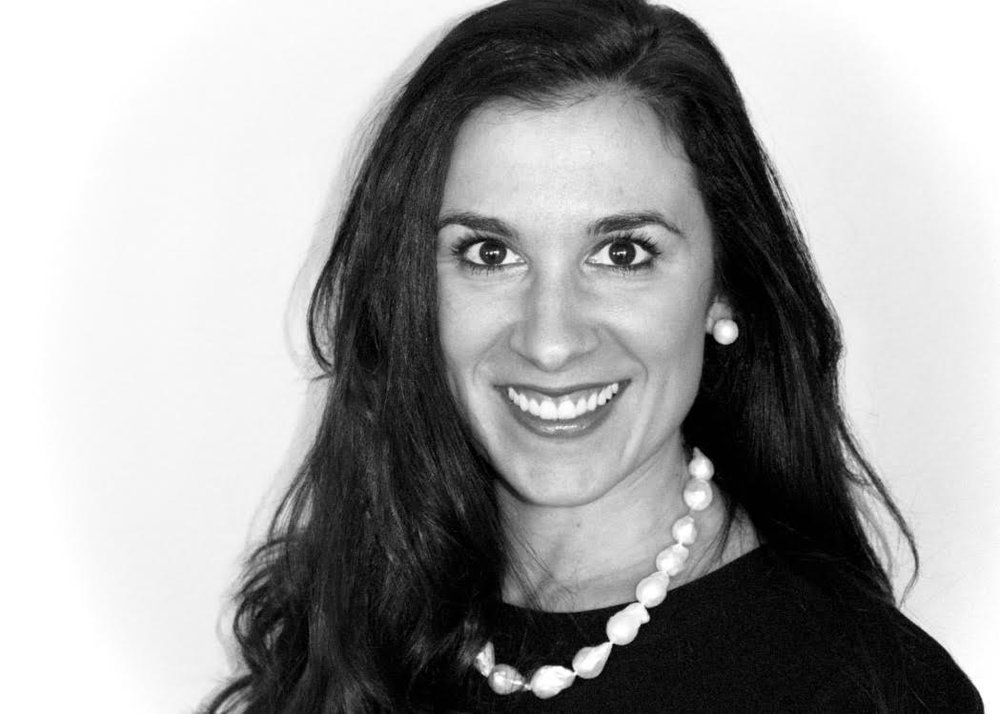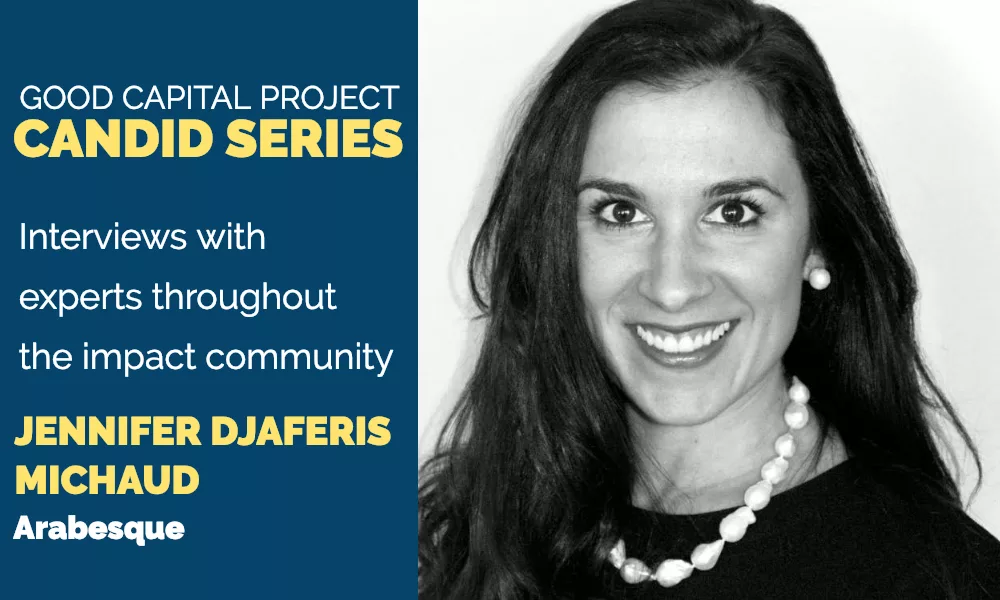
Jennifer is a Director of Client Services for the United States and is based in Boston, Massachusetts. She is responsible for the execution of sales, marketing and business development initiatives for the region. Jennifer joins Arabesque with significant experience working with institutional clients in North America in sales and trading capacities while at Goldman Sachs & Co.
Good Capital Project: Tell us a bit about your professional history in this space. What was your motivation to move to a sustainable finance firm?
Jennifer Djaferis: A few years ago, I became familiar with sustainable investing and it was a concept that truly resonated. In January 2018, I joined Arabesque as the firm interestingly combined elements I believe are the way forward in the investment space – quantitative analysis and sustainability.
At Arabesque, our mission is to make sustainable and responsible investing available to everyone and to empower people through the transparency of data. At Arabesque, we believe economic value creation can be combined with environmental stewardship, social inclusion, and sound governance because sustainability factors are more than merely extra financial considerations for investors; they form the foundation for successful markets. This was my motivation for transferring into this space.
GCP: As a relatively new concept, sustainable investing does not have a specific set of standards to abide by – how has Arabesque been able to overcome this challenge?
JD: Sustainability or ESG data is still quite disparate and not standardized, which makes its interpretation, and application in investment decisions difficult. However, advancements in technology have made it easier. At Arabesque we leverage Artificial Intelligence (AI) and machine learning advancements in technology as we develop our own products.
As a firm, we continue to build the infrastructure needed to service growing industry demands, bringing this new dimension of analysis to investing. We have tools, such as Arabesque S-Ray ®, which utilizes machine learning, big data, and systematically combines data from different sources to produce sustainability scores for firms providing additional transparency into corporate behavior. From an investment perspective, such non-traditional data points can change the way people interact with their investments. In this way, finance can be a catalyst for change by allowing investments to reflect personalized values which are unique to us all.
GCP: Tell us about more Arabesque’s S-Ray analysis. How did Arabesque’s team go about quantifying sustainability performance?
JD: Arabesque S-Ray ® is our proprietary tool that allows anyone to monitor the sustainability of approximately 7,000 of the world’s largest organizations’ – which constitute around 92% of the global market capitalization. Through machine learning and big data, S-Ray ® systematically combines over 200 ESG metrics with new signals from over 50,000 sources across 15 different languages.
Our S-Ray® technology takes raw data gathered from companies, NGOs, and news outlets – leveraging machine learning and AI – which are mapped to 22 Feature layer sustainability topics. It is from here that we then derive our top-level scores. The top-level scores are three lenses which allow clients to gain more transparency into corporate behavior.
The first lens is our Global Compact (GC) score, which provides a normative assessment of companies based on the four core principles of the United Nations Global Compact: human rights, labor rights, anti-corruption, and the environment. In my mind, the GC score is indicative of corporate behavior and provides an indication of potential reputational risks that may arise.
The second lens we provide is an Environment, Social, Governance (ESG) score, which is an indication of how companies are managed and are all about identifying companies that are better positioned to outperform over the long term. When computing the ESG Score of a company the algorithm will only use information that significantly helps explain future risk-adjusted performance. Essentially, we look at what is going to be important for a company’s future profitability, which varies depending on the sector or industry.
The third lens is a preferences filter. This provides an indication of companies that have revenues tied to business lines, such as weapons, gambling, tobacco, alcohol, fossil fuel, stem cells, nuclear, GMO, pork, adult entertainment, and defense. We will receive an indication if revenues tied to the previously mentioned business units are 5% or greater.
Arabesque S-Ray® has developed a large and expanding dataset of information that has many diverse uses depending on how people want to apply sustainability to their own processes and screenings. This tool aims to provide increased transparency into a company’s long and short-term risks and opportunities by analyzing its corporate DNA through a range of sustainability lenses. Using a quantitative approach to analysis and advancements in technology, these methodologies are designed to minimize human biases and provide increased coverage on a vast universe of companies.
GCP: Arabesque clearly prioritizes data quality in their portfolios. Can you describe the quantitative assessment that goes into selecting individual stocks?
JD: Arabesque has two separate businesses, we have asset management on one side and our Arabesque S-Ray® data business on the other. Our asset management business utilizes S-Ray ® at the starting point to define our investment universe, then we apply proprietary logic, which varies by strategy for stock selection.
Leveraging the technology of S-Ray® in our investment processes, we first set thresholds for GC and ESG scores that companies must have to be considered for investment. If they are below these thresholds they will not be considered for investment. This is one step we take to manage potential risks in our portfolio. We monitor those in the bottom tier for positive momentum for future addition back into the investable universe for consideration. Other considerations for defining our investment universe include a liquidity screen and exclusions for business involvements, which vary per strategy. Arabesque collects data daily allowing us to have a more current indication of how these scores are moving over time.
GCP: A year ago Arabesque developed a systematic framework incorporating sustainability into the global equity universe. Can you tell us about the motivation behind its development and your clients’ response to it?
JD: Our firm has sustainability at its core which has been demonstrated on the asset management side and data side. The root of our business started as an asset management firm that focused on ESG and quantitative investments. We developed Arabesque S-Ray® initially for our own use and about a year and a half ago, due to demand, began offering this to others through licenses. As a firm, we wanted to share this information to help others become more informed, which is part of our firm’s core mission.
As investors developing these strategies, we considered our own needs in wanting to invest in companies aligned with our values. We wanted to apply advancements in technology to our approach and produced a systematic and quantitative way to invest in sustainable companies. The client response to this approach has resonated across the board and we were and continue to develop products off of this interest. The discussion around sustainable investment is unique for everyone and there’s no right or wrong answer. However, advancements in technology have enabled greater transparency into companies, which changes the interactions people have with finance. We’re able to go further than simply identifying a financially sound company. Now, we can determine if the interests of a company align with a client’s personal values, which changes the relationship between people and stocks.


